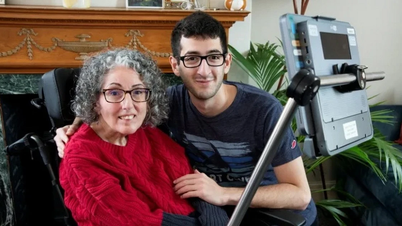Scientists at LSE believe AI could be the key to humans gaining a deeper understanding of the emotional and communicative world of animals. Photo: Getty Images
The first center to research animal consciousness and AI
The Jeremy Coller Centre for Animal Sensation, based at the London School of Economics and Political Science (LSE), will officially open from September 30 with the aim of exploring how animals, from dogs and cats to crabs and cuttlefish... perceive the world.
With an investment of £4 million, the centre will bring together experts from many interdisciplinary fields such as neuroscience, philosophy, law, veterinary medicine, psychology, artificial intelligence and economics , to comprehensively study animal behaviour and consciousness.
A key part of the center's mission is to research how AI can “translate” behavioral signals into human language, helping owners recognize their pets' emotional needs.
However, technology does not always mean truth. Professor Jonathan Birch, director of the center, argues that large language models (LLMs) can lead owners to misunderstand their pets.
“AI often produces pleasant responses to users rather than accurately reflecting reality. If an app says your dog is happy when it is actually anxious or in pain, the consequences for animal welfare are serious,” he warns.
One of the central issues raised is the lack of a legal framework for AI applications for animals, from smart collars to pet care assistant robots.
In addition, integrating AI into automated agriculture also poses major ethical challenges. When robots replace humans in caring for livestock, will they recognize when the animals are in pain? How can AI recognize animal emotions? These are all questions that have not yet been answered.
Professor Birch emphasized that, as well as the debate about self-driving cars needing to avoid people, society should also discuss the ability of AI cars to recognize and avoid animals such as dogs and cats - sentient beings.
The center will work with international organizations to develop ethical guidelines and codes of conduct, similar to the ethical frameworks in medical or educational AI that are being developed.
When technology becomes an interspecies bridge
Behind the research on AI and animals lies a more ambitious goal: to better understand human consciousness itself. Professor Kristin Andrews, one of the LSE’s directors, believes that studying how AI responds to animals could help answer a core question: what makes a conscious state?
“Just as genetics has made great strides in studying simple organisms, studying animal cognition could pave the way for neuromedicine and consciousness restoration technology,” she said.
Behavioral psychologist Dr. Kristof Dhont also emphasized the importance of technology in deciphering the moral paradox: humans love animals but still maintain systems that exploit them for economic gain.
Meanwhile, Jeremy Coller, the man behind the charity who has long been associated with the centre, said his aim was to change the way people view and treat other animals.
“Only by better understanding how animals feel and communicate can we recognize the shortcomings in how we treat them. Just as the Rosetta Stone once deciphered hieroglyphics, I believe the power of AI will help uncover how animals experience and respond to our interactions,” he said.
Source: https://baovanhoa.vn/nhip-song-so/cong-nghe-ai-mo-ra-ky-nguyen-giao-tiep-voi-dong-vat-152016.html






![[Photo] Special art program "Da Nang - Connecting the future"](https://vphoto.vietnam.vn/thumb/1200x675/vietnam/resource/IMAGE/2025/9/2/efdd7e7142fd45fabc2b751d238f2f08)

![[Photo] Ho Chi Minh City residents show their affection to celebrate the 80th anniversary of the August Revolution and National Day September 2](https://vphoto.vietnam.vn/thumb/1200x675/vietnam/resource/IMAGE/2025/9/3/55d860cbb63a40808e1e74ad9289b132)































![[Photo] Lao President Thongloun Sisoulith and President of the Cambodian People's Party and President of the Cambodian Senate Hun Sen visit the 95th Anniversary Exhibition of the Party Flag Lighting the Way](https://vphoto.vietnam.vn/thumb/1200x675/vietnam/resource/IMAGE/2025/9/2/3c1a640aa3c3495db1654d937d1471c8)




























































Comment (0)